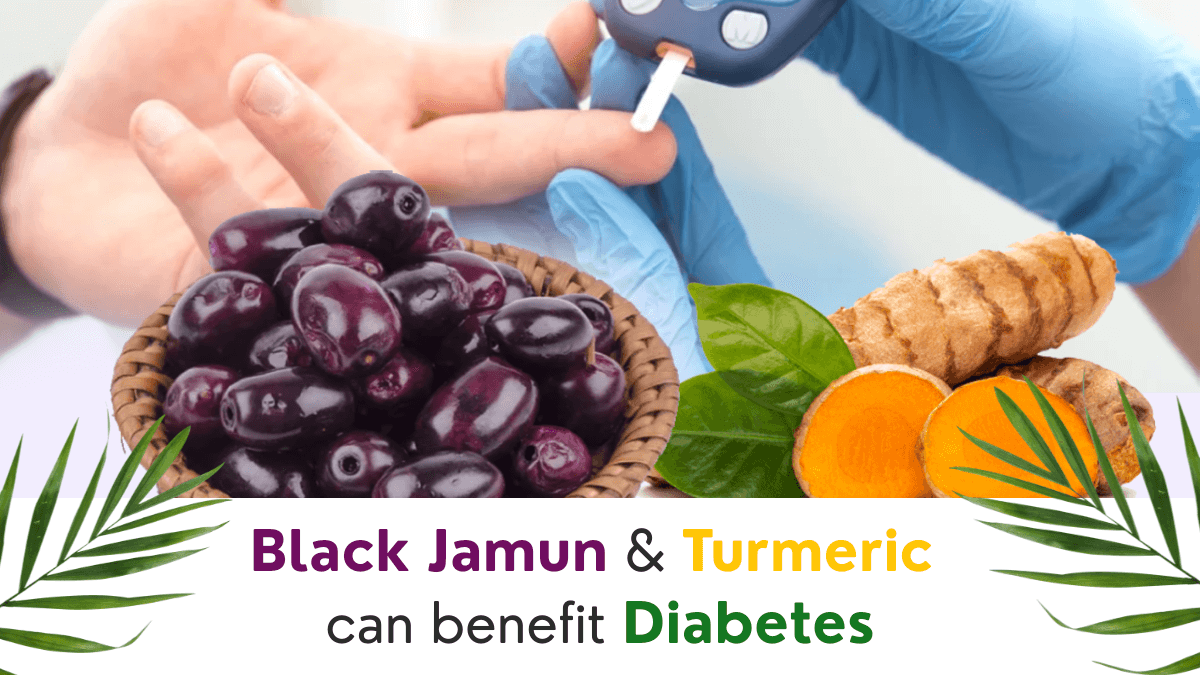Black Jamun & Turmeric Can Benefit Diabetes

Svetakutaja Can Help In Psoriasis
February 25, 2023
Is Sugar toxic?
March 11, 2023Black Jamun & Turmeric Can Benefit Diabetes
Diabetes is a disease of the hormonal or endocrine system in which patients develop insulin resistance, or the pancreas produces little to no insulin resulting in excessive accumulation of glucose in the blood. As a result, people experience the classical symptoms - polyphagia (excessive hunger), polydipsia (excessive thirst) and polyuria (excessive urination).
Diabetes has now become a very common disorder among people due to their sedentary lifestyle and lack of physical activity.
Even though it is an irreversible condition, its symptoms can be improved by making lifestyle modifications. In addition, it'll help prevent the progression of the disease.
Some significant lifestyle changes include exercising to use the excess sugar in the blood, eating a diet that controls blood glucose levels and controlling body weight if obese. In addition, adding certain diabetic-friendly foods such as various forms of black Jamun, turmeric, chia seeds, avocado, green leafy vegetables, and others have also been known to be healthy for diabetics.
Let us discuss how black Jamun and turmeric among this help improve the condition of people with diabetes.
Benefits of Black Jamun
Black Jamun is a small fruit that has a huge seed. Even though it is a seasonal fruit, it can be extracted and taken in the form of juices, sticks, pellets, and others. It is highly beneficial for people with diabetes. It not only helps control diabetes but also enhances insulin activity and sensitivity.
Jamun is juicy, sweet and tangy to taste. This fruit has great importance in Ayurveda and is extensively used in treating various ailments. Its compound, called Jambolin, lowers blood sugar and improves insulin sensitivity. It contains proteins, fibres, vitamins, and minerals like calcium, potassium, manganese, iron, phosphorus, and vitamins C and B6.
The powdered form of Jamun seeds helps people with type-2 diabetes, non-insulin-dependent diabetes or insulin-dependent diabetes.
Studies suggest that Jamun slows the process of conversion of starch to glucose. As a result, the blood glucose levels do not spike suddenly on the metabolism of starch from food. In addition, Jamun is rich in antioxidants and fastens the healing process.
In people with type-2 diabetes, levels of insulin are low. Jamun aids in increasing the secretion of insulin or slows its degradation process.
To reap the benefits of Jamun, its seeds should be dried and powdered. Consumption of half a teaspoon of this powder with water regularly helps control the effects of diabetes.
Some other benefits of Jamun include:
Purification of blood: Jamun is a natural astringent. It purifies the blood, clears skin and keeps it free from acne.
Improves digestion: Jamun has antibacterial properties that improve gut health.
Improves immunity: Jamun is known to aid people with compromised immunity. This is especially true in individuals with advanced stages of diabetes that involve multiple organs.
Rich in Vitamin C: A classic symptom experienced by diabetics is delayed wound healing. Since Jamun contains abundant vitamin C, it can fasten the healing process. In addition, it can close wounds earlier that would normally take longer to heal.
Haemoglobin count: Jamun is a rich source of iron and thus improves haemoglobin levels when taken in sufficient quantities regularly.
Benefits of Turmeric
Turmeric is a commonly added spice in Asian households. It is yellow in colour and has abundant anti-inflammatory and antiseptic properties. It's often employed in improving liver and gut issues, healing wounds faster and preventing them from getting infected. In addition, it helps improve pain in people with arthritis. Moreover, it is rich in antioxidants and might help prevent numerous diseases such as cancer, diabetes, and others.
Research suggests that turmeric plays a role in reducing blood sugar levels in people with type 2 diabetes. Its active compound, curcumin, is the main component that imparts anti-inflammatory and antiseptic properties. A study suggests that curcumin plays an active role in reducing blood sugar levels. Moreover, turmeric extracts aid in the stabilisation of blood glucose levels and helps manage the condition.
The recommended allowance of turmeric is about 12g. Even though turmeric is effective in treating various conditions, its excess is harmful to the body. Some significant unpleasant side effects include:
Nausea
Diarrhoea
Indigestion
Increased blood pressure
Liver disorders
Worsening of pre-existing gallbladder disease
It is imperative to consume the above-discussed foods with caution and within limits, for they can be harmful if taken in large quantities.







